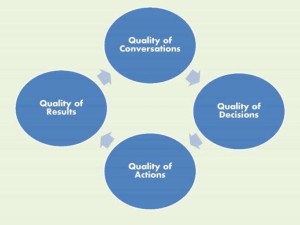Imagine having to do an important presentation. A lot hinges on its success. Get it right and you’ll maintain your grade point average or secure your first overseas job. Get it wrong and all the money you have invested in studying overseas could be wasted.
 As part of a leadership development program at the Monash Business School that I have been facilitating for over 8 years, I teach public speaking.
As part of a leadership development program at the Monash Business School that I have been facilitating for over 8 years, I teach public speaking.
The majority of the attendees are international students. In the pre-workshop survey that I conduct, the responses to the question, “What are you greatest concerns regarding public speaking?” are generally along the lines of, “English is not my first language and I am worried that I will use the wrong words when I speak. This causes me to worry a lot about public speaking.”
To alleviate their concerns about this issue, I explain the following key points to them.
1. Your audience wants you to be successful
When you are an audience member, what are you hoping the speaker will do?
The majority of people I have asked this question respond by saying that they hope the speaker is affective in getting their message across.
I then ask, “Are you waiting for the speaker to fail?”
“No, of course not!” is the response I receive.
The first place to start to be an effective public speaker is to realise that the audience does not want you to fail and is not sitting there ready to pounce on every mistake that you make. Instead, they are anticipating that you will get your message across and want you to do well.
2. When English is another language for you, use the words you have
Everyone has an accent, me included. Your accent only becomes noticeable when it is different to the accents of the people with whom you are speaking.
As soon as you start to speak, your audience will recognise your accent and immediately understand that English may not be your first language. Over time your vocabulary will grow, so use the words that you have at your disposal, rather than worrying about the words that you don’t have. Your audience will understand.
3. Test your speech on people for whom English is their first language
A quick way to expand your vocabulary is to test your speech (as part of your preparation) with people for whom English is their first language. Give them the specific instruction that they are to identify when there may be an easier way to say what you are trying to say. You don’t have to use all of their feedback, especially if you don’t understand what they are suggesting you should say. Nevertheless this tip will quickly improve your vocabulary.
4. Include challenging words in your presentation
If there are words that you intend to use in your speech that you recognise may be difficult for the audience to understand due to your accent, include these words in your presentation. Make them nice and big so they are easy to read.
When your audience reads the words and connects them to your accent, it helps them to ‘tune in’ to your accent which in turn helps them to understand you. As an example, last weekend a Thai student spoke about “Mergers and Acquisitions”. When she first spoke without an accompanying presentation, very few audience members understood what she was saying. When she repeated the speech, this time with an accompanying presentation with the words, “Mergers and Acquisitions” prominently displayed, everyone understood what she was saying. They ‘tuned in’ to her accent.
5. Recognise that what you are doing is amazing
There are over 320,000 international students in Australia. This can make it seem as though it isn’t a big achievement to do a presentation in English. The reality is that any presentation that is conducted in another language is an amazing achievement. Be proud of yourself because you really are awesome.
I am constantly in awe of the international students with whom I work. Studying, let alone public speaking in another language is a huge challenge, yet you do it.
Use these five tips to help you to build confidence in your public speaking. See yourself as someone who is constantly learning and improving and be proud of your improvements over time.








